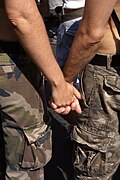This article needs additional citations for verification .(August 2023) |
| Easter in Berlin | |
|---|---|
 One of many fetish shops in the Schöneberg neighborhood of Berlin | |
| Genre | BDSM, leather, fetish |
| Begins | 1972 |
| Frequency | annual, at Easter holiday (March or April) |
| Location(s) | Schöneberg, Berlin, Germany |
| Website | easterberlin |
Easter in Berlin, also known as Easter Berlin, [1] founded in 1972, [2] [3] is one of the biggest leather and fetish events in Europe. [4] It takes place in Berlin every year at Easter (March or April).


